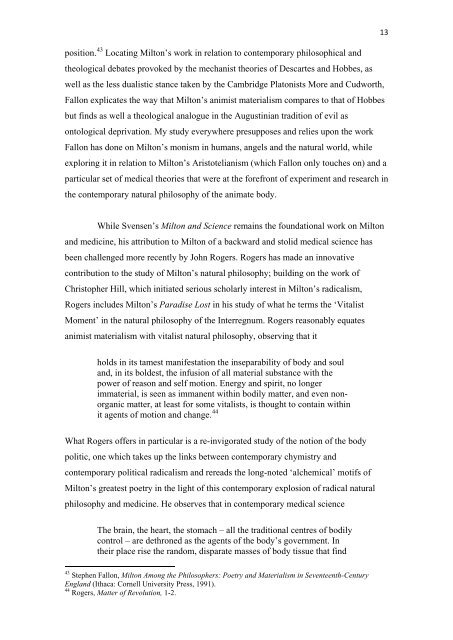Medical Science and the Anatomia Animata in Milton's Paradise Lost
Medical Science and the Anatomia Animata in Milton's Paradise Lost
Medical Science and the Anatomia Animata in Milton's Paradise Lost
You also want an ePaper? Increase the reach of your titles
YUMPU automatically turns print PDFs into web optimized ePapers that Google loves.
position. 43<br />
Locat<strong>in</strong>g Milton’s work <strong>in</strong> relation to contemporary philosophical <strong>and</strong><br />
<strong>the</strong>ological debates provoked by <strong>the</strong> mechanist <strong>the</strong>ories of Descartes <strong>and</strong> Hobbes, as<br />
well as <strong>the</strong> less dualistic stance taken by <strong>the</strong> Cambridge Platonists More <strong>and</strong> Cudworth,<br />
Fallon explicates <strong>the</strong> way that Milton’s animist materialism compares to that of Hobbes<br />
but f<strong>in</strong>ds as well a <strong>the</strong>ological analogue <strong>in</strong> <strong>the</strong> August<strong>in</strong>ian tradition of evil as<br />
ontological deprivation. My study everywhere presupposes <strong>and</strong> relies upon <strong>the</strong> work<br />
Fallon has done on Milton’s monism <strong>in</strong> humans, angels <strong>and</strong> <strong>the</strong> natural world, while<br />
explor<strong>in</strong>g it <strong>in</strong> relation to Milton’s Aristotelianism (which Fallon only touches on) <strong>and</strong> a<br />
particular set of medical <strong>the</strong>ories that were at <strong>the</strong> forefront of experiment <strong>and</strong> research <strong>in</strong><br />
<strong>the</strong> contemporary natural philosophy of <strong>the</strong> animate body.<br />
While Svensen’s Milton <strong>and</strong> <strong>Science</strong> rema<strong>in</strong>s <strong>the</strong> foundational work on Milton<br />
<strong>and</strong> medic<strong>in</strong>e, his attribution to Milton of a backward <strong>and</strong> stolid medical science has<br />
been challenged more recently by John Rogers. Rogers has made an <strong>in</strong>novative<br />
contribution to <strong>the</strong> study of Milton’s natural philosophy; build<strong>in</strong>g on <strong>the</strong> work of<br />
Christopher Hill, which <strong>in</strong>itiated serious scholarly <strong>in</strong>terest <strong>in</strong> Milton’s radicalism,<br />
Rogers <strong>in</strong>cludes Milton’s <strong>Paradise</strong> <strong>Lost</strong> <strong>in</strong> his study of what he terms <strong>the</strong> ‘Vitalist<br />
Moment’ <strong>in</strong> <strong>the</strong> natural philosophy of <strong>the</strong> Interregnum. Rogers reasonably equates<br />
animist materialism with vitalist natural philosophy, observ<strong>in</strong>g that it<br />
holds <strong>in</strong> its tamest manifestation <strong>the</strong> <strong>in</strong>separability of body <strong>and</strong> soul<br />
<strong>and</strong>, <strong>in</strong> its boldest, <strong>the</strong> <strong>in</strong>fusion of all material substance with <strong>the</strong><br />
power of reason <strong>and</strong> self motion. Energy <strong>and</strong> spirit, no longer<br />
immaterial, is seen as immanent with<strong>in</strong> bodily matter, <strong>and</strong> even nonorganic<br />
matter, at least for some vitalists, is thought to conta<strong>in</strong> with<strong>in</strong><br />
it agents of motion <strong>and</strong> change. 44<br />
What Rogers offers <strong>in</strong> particular is a re-<strong>in</strong>vigorated study of <strong>the</strong> notion of <strong>the</strong> body<br />
politic, one which takes up <strong>the</strong> l<strong>in</strong>ks between contemporary chymistry <strong>and</strong><br />
contemporary political radicalism <strong>and</strong> rereads <strong>the</strong> long-noted ‘alchemical’ motifs of<br />
Milton’s greatest poetry <strong>in</strong> <strong>the</strong> light of this contemporary explosion of radical natural<br />
philosophy <strong>and</strong> medic<strong>in</strong>e. He observes that <strong>in</strong> contemporary medical science<br />
The bra<strong>in</strong>, <strong>the</strong> heart, <strong>the</strong> stomach – all <strong>the</strong> traditional centres of bodily<br />
control – are dethroned as <strong>the</strong> agents of <strong>the</strong> body’s government. In<br />
<strong>the</strong>ir place rise <strong>the</strong> r<strong>and</strong>om, disparate masses of body tissue that f<strong>in</strong>d<br />
43 Stephen Fallon, Milton Among <strong>the</strong> Philosophers: Poetry <strong>and</strong> Materialism <strong>in</strong> Seventeenth-Century<br />
Engl<strong>and</strong> (Ithaca: Cornell University Press, 1991).<br />
44 Rogers, Matter of Revolution, 1-2.<br />
13
















